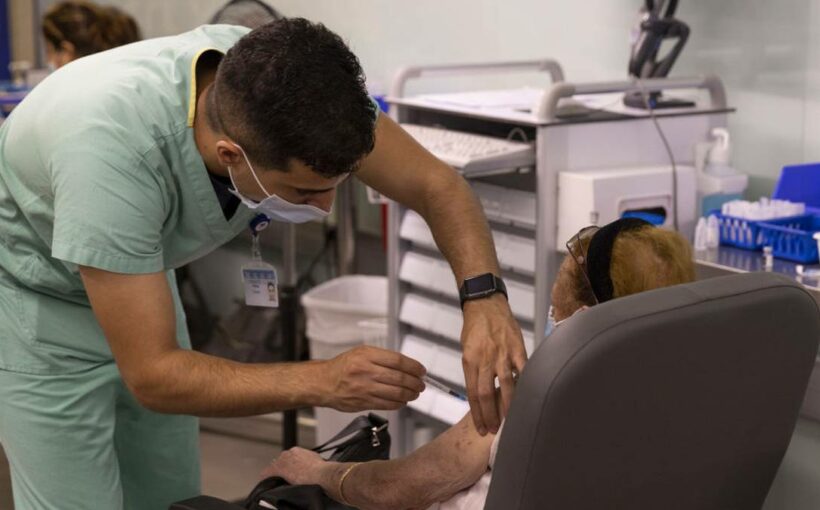This June, as I packed for a trip to London, I realised I couldn’t find a single mask in my house, nor in any of the stores by my house in Tel Aviv.
It had been months since anyone had needed one in Israel, one of the fastest- and most-vaccinated nations in the world. By mid-March, Israelis were partying as lockdowns ended and by April, masks had more or less vanished, turning the tiny country into a tantalising glimpse of a post-pandemic future.
“Why do you want a mask? Corona is over,” chuckled my neighbourhood grocery store grandma, as she handed me a half-empty bag of masks she found in the back as I rushed to the airport.
A month later, as I returned from London after my own bout of Covid-19 — one of the earlier breakthrough cases of the fully vaccinated catching the Delta variant — masks were everywhere.
So was coronavirus. From a few dozen daily cases in early June — even zero on June 9 — new Covid infections twice hovered near 6,000 this week, the highest daily rate in six months.
Having won early access to supplies of the BioNTech/Pfizer jab in exchange for sharing nationwide data on how mass vaccination drives affect the pandemic, Israel is a closely watched indicator for where well-inoculated developed economies are heading.
After months of euphoria, the data out of Israel is troubling. The Israeli ministry of health has twice revised downwards the long-term efficacy of the jabs — from the advertised 94 per cent protection from asymptomatic infections against the then-dominant Alpha variant, to as low as 64 per cent against the now-dominant Delta variant.
As new infections soared, so did the long tail of hospitalisations. Even though the unvaccinated were five to six times as likely to end up seriously ill, the vaccine’s protection was waning fastest for the oldest — the most vulnerable — who got their first jabs as early as December.
At this rate, health officials predicted at least 5,000 people would need hospital beds by early September, half of them with serious medical needs, twice as many as Israel is equipped to handle.
Prime Minister Naftali Bennett, faced with the prospect of locking down the Jewish State over the high holidays, when grandchildren rush to long weekends with their saftas, braced the nation for more pain — a $770m emergency plan to double hospital capacity to deal with seriously ill patients.
Bennett was honest with Israelis when he announced the measure on Wednesday: the government was trying to cushion the blow. On August 1, it had started offering people over 60 a third shot of the Pfizer vaccine, embarking on its own public health experiment as it tumbled into an unpredictable fourth wave. “We have to raise hospital capacity to buy time until the vaccination campaign goes into effect and starts to stem the outbreak,” Bennett said.
So far, 775,000 people have taken their third shots and doctors say they can see antibody counts rising measurably within days of the jab. From this weekend, people over 50 will be offered a third shot.
But health officials, and former prime minister Benjamin Netanyahu, 71, grumbled that Israel may have waited too long.
Netanyahu, the first Israeli to be fully inoculated when, as premier, he catapulted Israel to the front of the line for Pfizer’s jabs in a data-for-shots deal, had seen his own antibody count dip eight months later.
He started showing up to the Knesset double-masked and demanding that Israel approve the booster shots. “Better late than never,” he complained while getting his third shot.
For Israelis, the booster shots are a reminder that they are on the frontier of Covid-19 vaccinations. They celebrated when they were the first to get jabbed, cheering Pfizer as lockdowns ended in March.
Now, they are the first to experience the limits of the vaccine and the first to accept a long-whispered inevitability — regular booster shots to stay protected.
At my neighbourhood grocery store, a giant sign now hangs outside, reminding shoppers to wear a mask. The friendly grandma who struggled to rustle up some masks for me not two months ago now sells them in packs of a hundred.
If there’s a lesson to be learnt from Israel today, it is this: corona, in fact, is not over. This summer was just an intermission. Next comes winter.
– Financial Times
Source: Read Full Article

/cloudfront-ap-southeast-2.images.arcpublishing.com/nzme/U5VCDN4P4JJB35V3EWRSCZD33M.jpg)